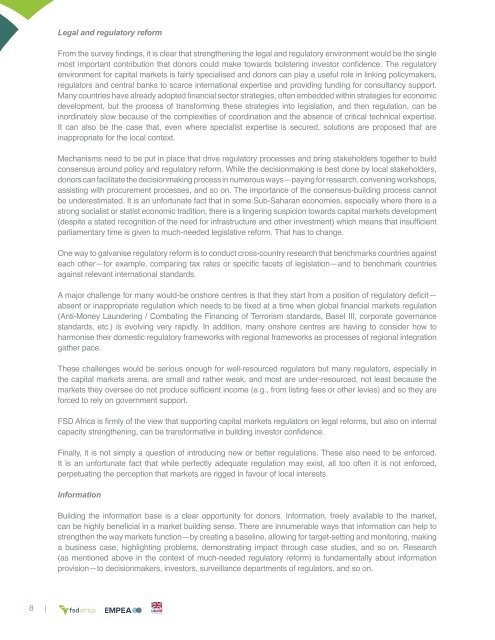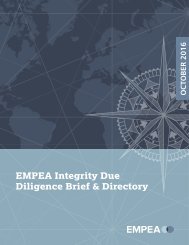You also want an ePaper? Increase the reach of your titles
YUMPU automatically turns print PDFs into web optimized ePapers that Google loves.
Legal and regulatory reform<br />
From the survey findings, it is clear that strengthening the legal and regulatory environment would be the single<br />
most important contribution that donors could make towards bolstering investor confidence. The regulatory<br />
environment for capital markets is fairly specialised and donors can play a useful role in linking policymakers,<br />
regulators and central banks to scarce international expertise and providing funding for consultancy support.<br />
Many countries have already adopted financial sector strategies, <strong>of</strong>ten embedded within strategies for economic<br />
development, but the process <strong>of</strong> transforming these strategies into legislation, and then regulation, can be<br />
inordinately slow because <strong>of</strong> the complexities <strong>of</strong> coordination and the absence <strong>of</strong> critical technical expertise.<br />
It can also be the case that, even where specialist expertise is secured, solutions are proposed that are<br />
inappropriate for the local context.<br />
Mechanisms need to be put in place that drive regulatory processes and bring stakeholders together to build<br />
consensus around policy and regulatory reform. While the decisionmaking is best done by local stakeholders,<br />
donors can facilitate the decisionmaking process in numerous ways—paying for research, convening workshops,<br />
assisting with procurement processes, and so on. The importance <strong>of</strong> the consensus-building process cannot<br />
be underestimated. It is an unfortunate fact that in some Sub-Saharan economies, especially where there is a<br />
strong socialist or statist economic tradition, there is a lingering suspicion towards capital markets development<br />
(despite a stated recognition <strong>of</strong> the need for infrastructure and other investment) which means that insufficient<br />
parliamentary time is given to much-needed legislative reform. That has to change.<br />
One way to galvanise regulatory reform is to conduct cross-country research that benchmarks countries against<br />
each other—for example, comparing tax rates or specific facets <strong>of</strong> legislation—and to benchmark countries<br />
against relevant international standards.<br />
A major challenge for many would-be onshore centres is that they start from a position <strong>of</strong> regulatory deficit—<br />
absent or inappropriate regulation which needs to be fixed at a time when global financial markets regulation<br />
(Anti-Money Laundering / Combating the Financing <strong>of</strong> Terrorism standards, Basel III, corporate governance<br />
standards, etc.) is evolving very rapidly. In addition, many onshore centres are having to consider how to<br />
harmonise their domestic regulatory frameworks with regional frameworks as processes <strong>of</strong> regional integration<br />
gather pace.<br />
These challenges would be serious enough for well-resourced regulators but many regulators, especially in<br />
the capital markets arena, are small and rather weak, and most are under-resourced, not least because the<br />
markets they oversee do not produce sufficient income (e.g., from listing fees or other levies) and so they are<br />
forced to rely on government support.<br />
FSD Africa is firmly <strong>of</strong> the view that supporting capital markets regulators on legal reforms, but also on internal<br />
capacity strengthening, can be transformative in building investor confidence.<br />
Finally, it is not simply a question <strong>of</strong> introducing new or better regulations. These also need to be enforced.<br />
It is an unfortunate fact that while perfectly adequate regulation may exist, all too <strong>of</strong>ten it is not enforced,<br />
perpetuating the perception that markets are rigged in favour <strong>of</strong> local interests.<br />
Information<br />
Building the information base is a clear opportunity for donors. Information, freely available to the market,<br />
can be highly beneficial in a market building sense. There are innumerable ways that information can help to<br />
strengthen the way markets function—by creating a baseline, allowing for target-setting and monitoring, making<br />
a business case, highlighting problems, demonstrating impact through case studies, and so on. Research<br />
(as mentioned above in the context <strong>of</strong> much-needed regulatory reform) is fundamentally about information<br />
provision—to decisionmakers, investors, surveillance departments <strong>of</strong> regulators, and so on.<br />
8 |





